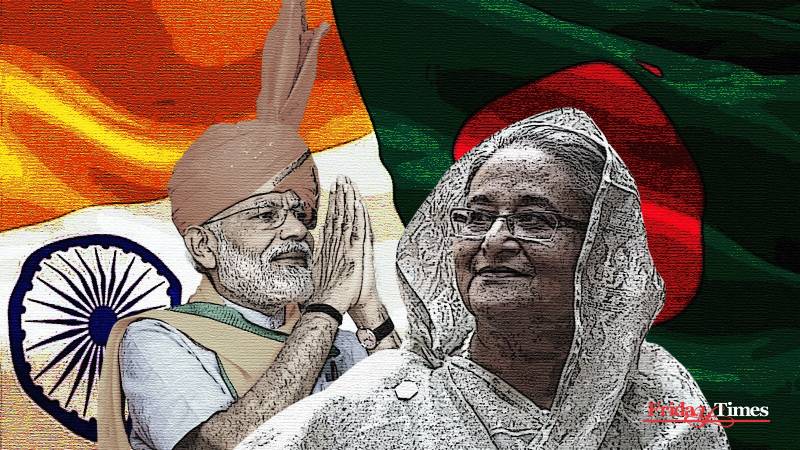
As a people's uprising in Dhaka deposed “dictatorial” Prime Minister Sheikh Hasina, a pall of gloom has descended over Delhi. The commentariat lapsed into its initial hysterical doom-mourning, then recovering to reprimand Hasina’s hubris-infested authoritarianism that over-bloated the 1971 liberation machinery to crush critics and opponents alike. The 1971 anti-Pakistan and anti-Bangladesh Nationalist Party-Jamaat-e-Islami narrative is more an Indian spun-web than a Bangladeshi nationalist theme.
After fleeing Dhaka on Wednesday, Hasina is staying put in New Delhi at an undisclosed location. The Indian leadership has so far avoided any official statement on the crisis involving her, but a series of meetings were hurriedly organized by External Affairs Minister S. Jaishankar and foreign secretary Vivek Misri. Meanwhile, the Indian media has uncharacteristically taken a lead in suggesting where the Indian government erred and what ways it must adopt as a future policy for their government.
Roy warned that if India fails to fathom the “meaning of change” in Bangladesh, it would have to face blowback from the new regime in Dhaka; even Bangla people would vent their pent-up grudges against the Indian establishment.
Shubhajit Roy, foreign affairs editor at The Indian Express, summed up Hasina's pro-India outlook in a Wednesday morning piece. He writes that when Hasina landed in Delhi after the assassination of her legendary father Sheikh Mujibur Rehman in 1975, she was adopted as a “daughter” by then senior Congress leader and later President of India, late Pranab Mukherjee, so that she could evade her assassins. She would continue to live with the Mukherjees at their Pandara Road residence in Delhi.
“These early experiences left an indelible impact on Hasina, and she developed a deep gratitude for the Indian leadership and its people,” wrote Roy. When Hasina won the elections in 2013, 2018 and 2024, and her legitimacy came sharp questions as all these polls were held sans opposition, India lent her unconditional support. India even shut its eyes and turned its ears deaf to screaming concerns from the US and the West that time and again called for restraint in the heavy-handedness deployed against opposition leaders and the absence of equal-playing field for Hasina’s political and policy opponents.
“It was because Bangladesh has been India’s highest-stake foreign policy investment. Very close to its heart and a key kernel of its strategic calculation in its immediate neighborhood. Its most cherished diplomatic triumph,” wrote a former foreign secretary of India in his column on Wednesday in a leading newspaper.
But now, wrote the foreign secretary, the old order in Bangladesh has changed irreversibly and it would be prudent for India to adjust to this change as swiftly as possible.
Roy warned that if India fails to fathom the “meaning of change” in Bangladesh, it would have to face blowback from the new regime in Dhaka; even Bangla people would vent their pent-up grudges against the Indian establishment.
“New Delhi has its diplomatic task cut out going forward… The challenges encountered during the earlier BNP-Jamaat years could well resurface. New Delhi could not afford to have another front open when the LoC and the border with Pakistan is hot again, and the Indian Army is in a long standoff with the PLA in eastern Ladakh. The Myanmar border also remains extremely volatile and the source of unrest in India’s Northeast,” wrote Roy.
C. Raja Mohan, one of the most respected mandarins of Indian statecraft, has suggested that it has to move beyond 1971 to help reshape the continent. He spelt out in his special column for Express that India would have to stop romanticising 1971. “Bangladesh is deeply divided on reinterpreting its history and Delhi can’t ignore this reality. Many forces there don’t buy into the Indian narrative on liberation of Bangladesh,” he wrote.
The Hindu, another newspaper known for its in-depth and serious commentary, was surprisingly subdued in its coverage of such a gigantically significant development in neighboring Bangladesh. It merely carried one analysis by its diplomatic editor Suhasini Haidar. She quoted Syed Munir Khasru, the head of international think tank IPAG in Dhaka, in her quest for knowing how India stands vis-à-vis the developing scenario. He said: “India’s unquestioning and unstinting support for Sheikh Hasina lost the country a lot of goodwill in Bangladesh. New Delhi must move quickly to send out a firm signal that despite its close relationship with Hasina, it firmly stands by the will and desire of the people of Bangladesh, and not just with one leader and one party.”
Haidar also quoted former Indian foreign secretary Niruapama Menon Rao, saying that “five decades ago, when we assisted the birth of Bangladesh in response to a grassroots people’s movement in a glorious exercise of our strategic autonomy, we came out on the right side of history.” Rao, wrote Haidar in a hint, warned against any “misstep” by New Delhi in its handling of Bangladesh.
The tectonic shift in the geopolitical landscape of Bangladesh, and in wider context that of South Asia, will surely keep the Indian foreign policy apparatus fretting over next few months, if not for years. C. Raja Mohan, one of the most respected mandarins of Indian statecraft, has suggested that it has to move beyond 1971 to help reshape the continent. He spelt out in his special column for Express that India would have to stop romanticising 1971. “Bangladesh is deeply divided on reinterpreting its history and Delhi can’t ignore this reality. Many forces there don’t buy into the Indian narrative on liberation of Bangladesh,” he wrote.
While Hasina may have had reasons to get stuck with 1971, he wrote, India has little strategic incentive to be tied down by it.

